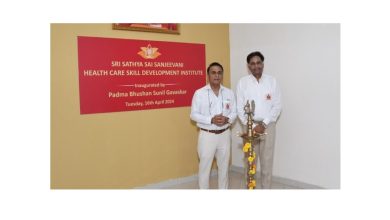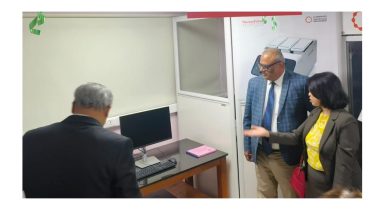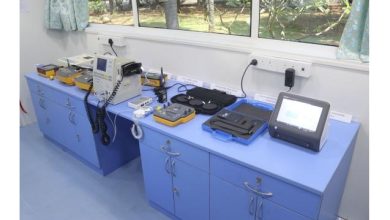Consultation on Draft Medical Device Policy Held, Expedite Medical Devices Law: Industry says

Industry bodies including AiMeD and MTaI as well as other stakeholders MoH&FW and institutes like Sree Chitra Tirunal Institute for Medical Sciences and Technology (SCTIMST) participated in a discussion held by Department of Pharmaceuticals to put forward suggestions on draft National Medical Device Policy in New Delhi today.
“We are happy that productive discussions took place and hope based on inputs an updated draft policy will be finalised next week for enabling other stakeholders like NGO ‘s healthcare care providers, consumer groups and insurance companies could be involved for consensus.” Said Mr Rajiv Nath, Forum Coordinator, AiMeD.
Dr Jitendra Sharma, CEO AMTZ – Andhra MedTech Zone shared his drafted policy 2017 which AiMeD had endorsed and focused on creation of Medical Devices Promotion council (with representation from All Association and stakeholder Ministry ) that was offered to be hosted by Andhra Pradesh CM, ChandraBabu Naidu at Vishakapatnam under DoP for coordinating with all government dept and other stakeholders for making India an international manufacturing hub for medical devices. India Imports over 27500 Cr Rs of Medical Devices and there is a huge import substitution and export potential.
“Medical devices sector made a historic landmark today with coverage on a variety of issues pertaining to medical devices. The consultation hosted by DOP deliberated on a series of subject to foster stability to the sector and advancement. The final draft is expected to be shared soon” said Dr Jitendra Sharma.
The five main factors highlighted by the Secretary and around which most discussions were focused were Management of imports of finished medical devices and their components by tariff review.
- Addressing patient safety and quality needs by regulations etc, and need for separate medical devices law.
- Having possibly BioMedical engineers to play the corresponding role of Pharmacists in hospitals to ensure healthcare providers abides by law in ensuring single use of devices where they are so labelled and proper storage and upkeep of equipment and its calibration etc, to avoid sad incidents like BRD Medical College, Gorakhpur tragedy.
- Product development and research & development prioritisation and acquisition of enabling critical technologies from overseas and role of Kalam Institute of Healthcare Technologies in creating a corpus for this as well as assisting in commercialisation of patents lying unutilised in Government institutions.
- Possible ways of consumer protection and ensuring affordable access by self regulations or a regulatory framework.
- Other factors which could boost domestic manufacturing
AiMeD highlighted the following points :
- Recommendations for basic import tariff to be 10% for medical devices (whose Export is over 5 Crores) and duty on components to be 5% next year and 7.5% thereafter as a make in India enabler. Concessional duty on raw material may be retained at 2.5% for now and to cover the devices which had not been addressed in Jan 2016 notification.
- Expedite Medical Devices Law to regulate all devices and ensure:
i) Definition of ‘Manufacturer’ needs to disallow legalization of Pseudo
Manufacturers and Traders to pass themselves off as Manufacturer
ii) Voluntary Compliance backed by 3rd Party ICMED Certification to be considered
as a Compliance option / reduced oversight. - Buy Indian Policy of Preferential Market Access and Preferential Pricing (as per World Bank Terms) for Indian medical device for Indian Public Healthcare Tenders and have weightage of 5% for ICMED Certification, 2% for ISO 13485 Certification and 3% for Design India Certification for promoting quality and indigenous development.
- Ban on refurbished medical equipment for next five years till such time we have a strong regulatory regime to ensure validated and calibrated equipments for limited access for enabling patient safety.
- MRP to be enforced on unit of sale of medical devices. We requested that No NPPA / DPCO for Medical Devices other than case of Stents (Combination Device, having Drug). We recommended to introduce price cap mechanism of Ex-Factory / Import Landed Price in a phased manner or bring in a 1% Cess on GST to act as disincentive for putting exorbitant MRP and to incentivise ethically correct Lower MRP.
- Medical Device Promotion Council – to focus on aspects of sectoral export promotion and indigenisation, to address India’s 70% import dependency, 90% on medical electronics.
While The basis was the earlier Task Force Recommendations Report published in April 2015 and the earlier Draft Policy released in June 2015 it was conceded that much water has flown under the bridge with many policy initiatives in interim period e.g. Addressing inverted duty structure for many devices and release of Medical Devices Rules by MoH&FW and Notification for enforcing MRP on all medical devices and Price Capping of Stents and Orthopaedic Implants ,so each Association got an opportunity to make a presentation on what was needed to boost manufacturing of medical devices and to provide affordable access of medical devices in the country.
The industry and importers were represented by AiMeD, Cii , Ficci , ADMI, PHD etc and other government departments were – NHSRC, NPPA , CDSCO, MoH&FW, Diety , Shri Chitra Institute, NiPER etc




